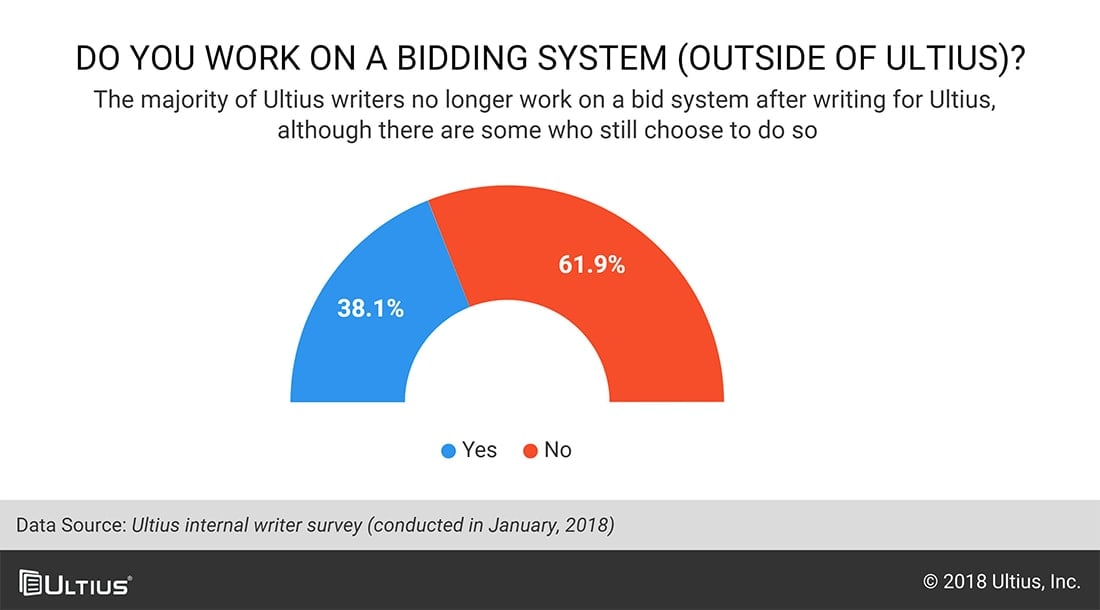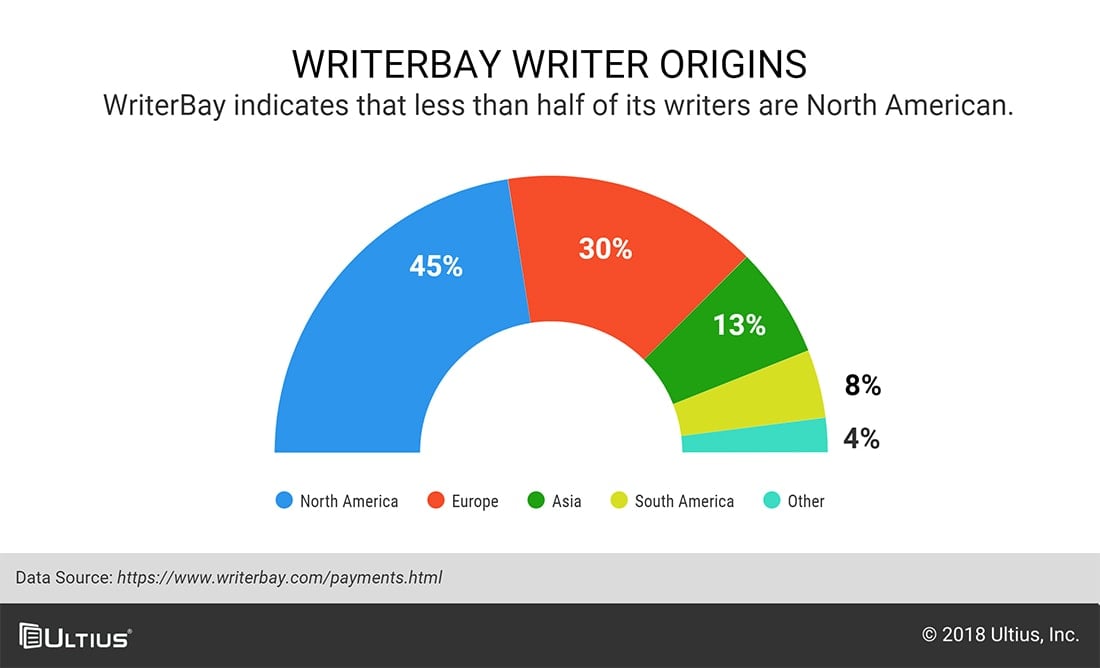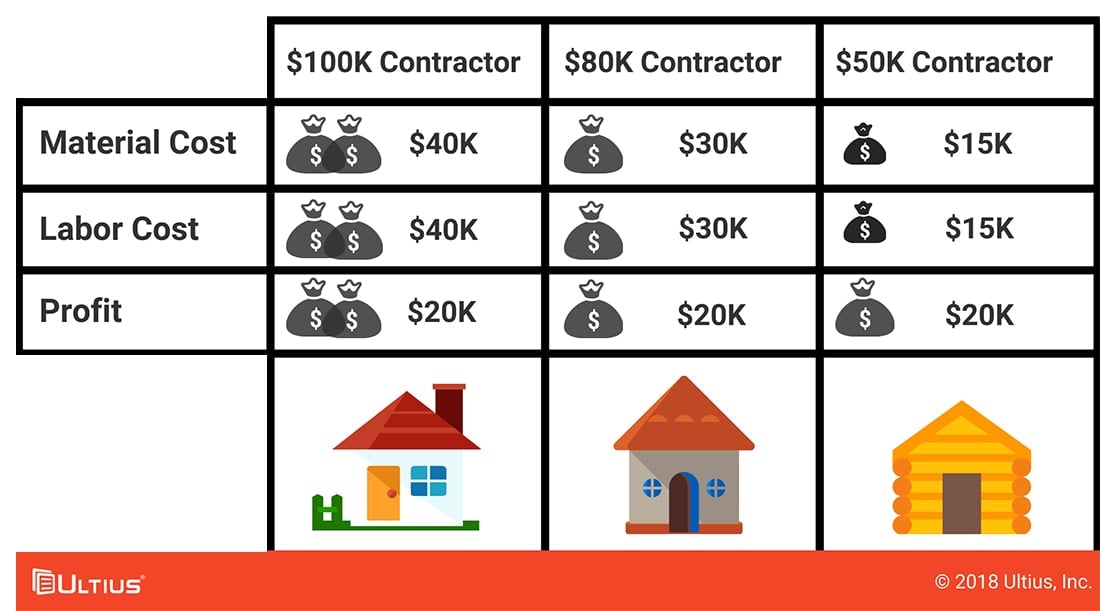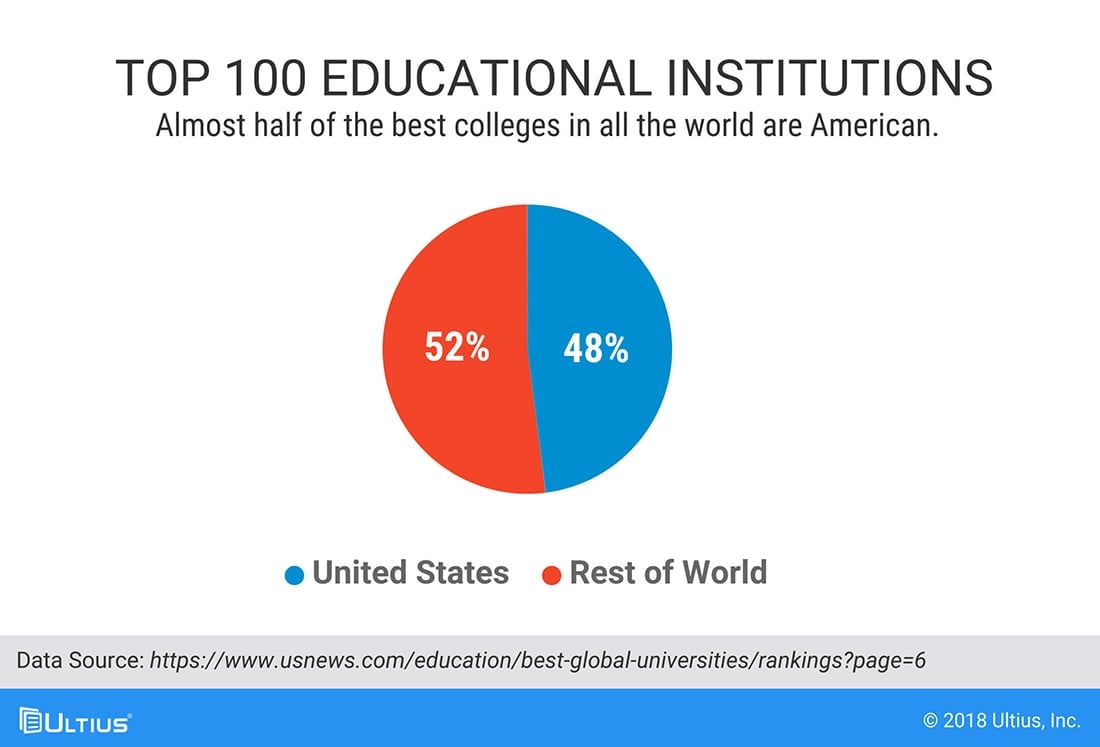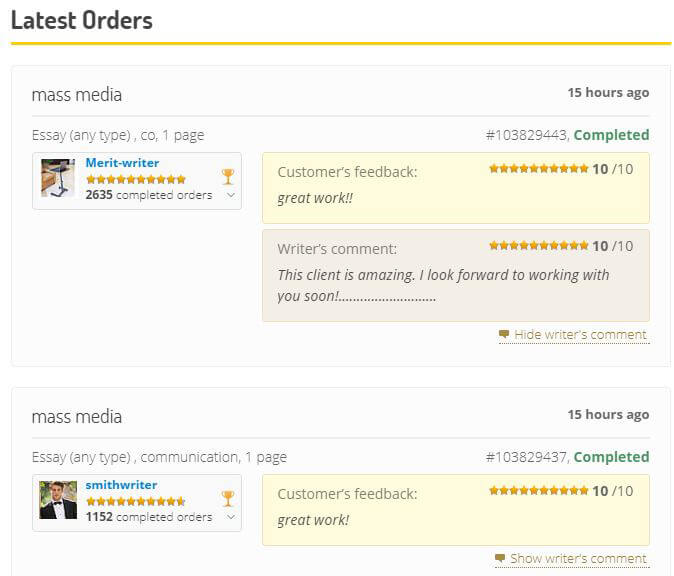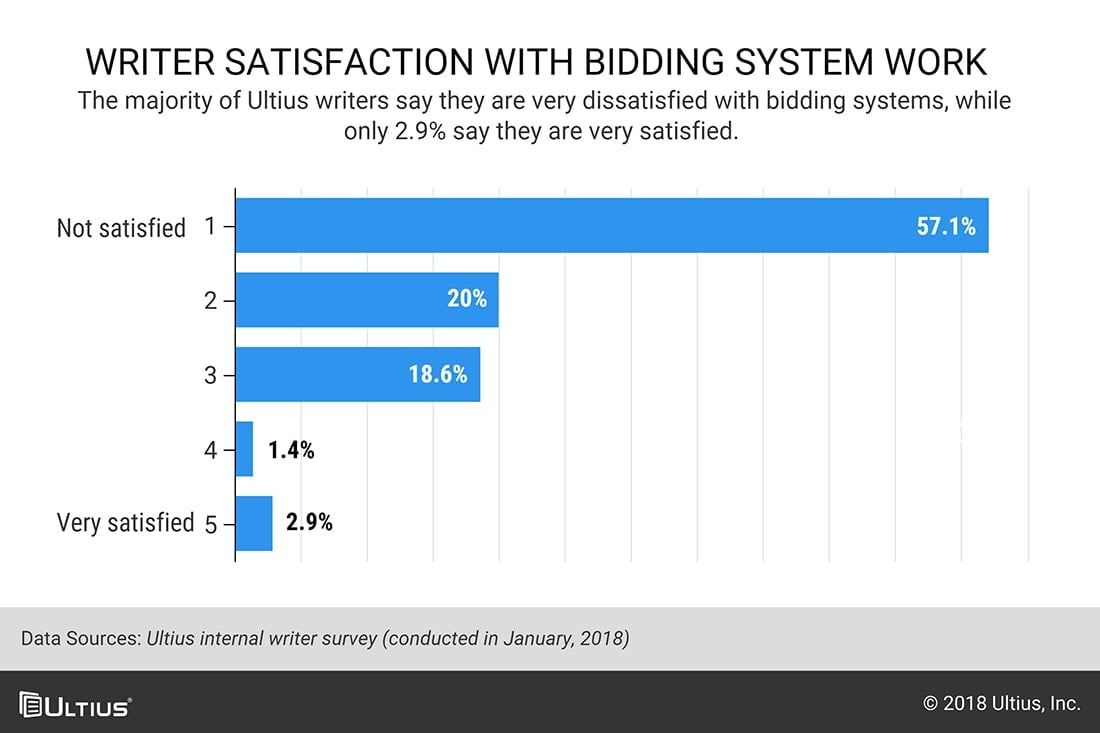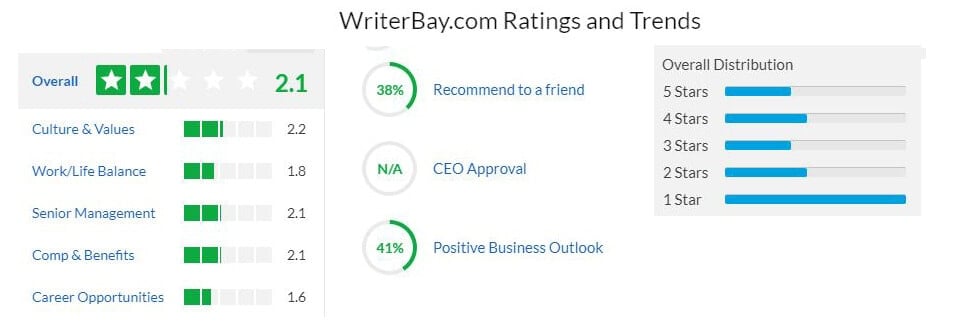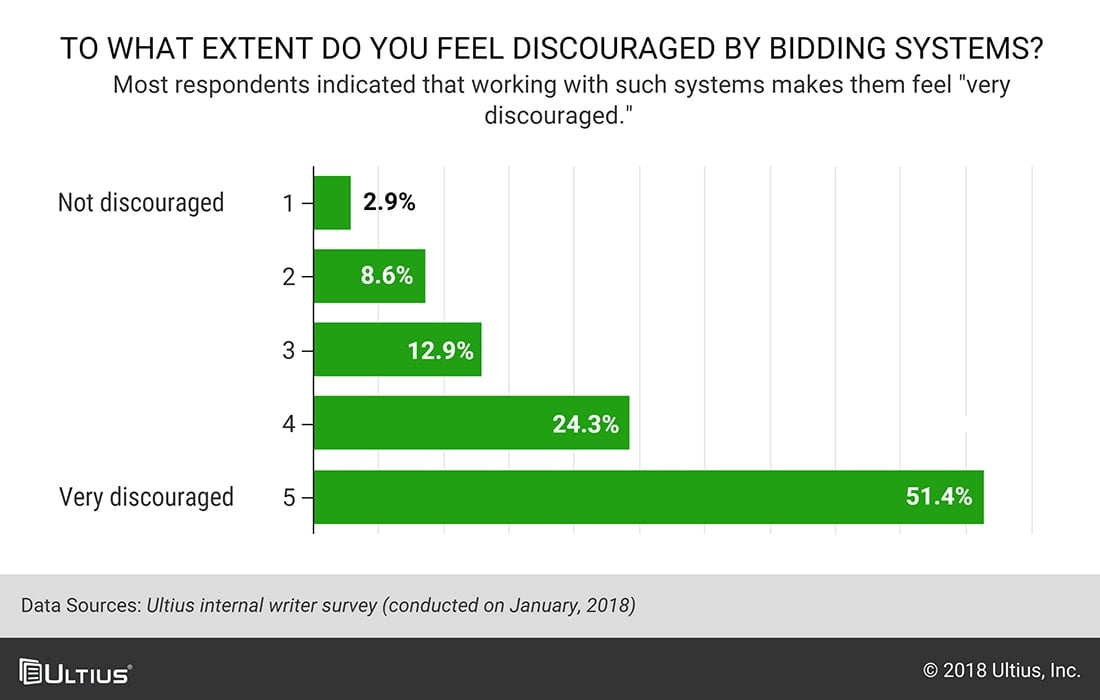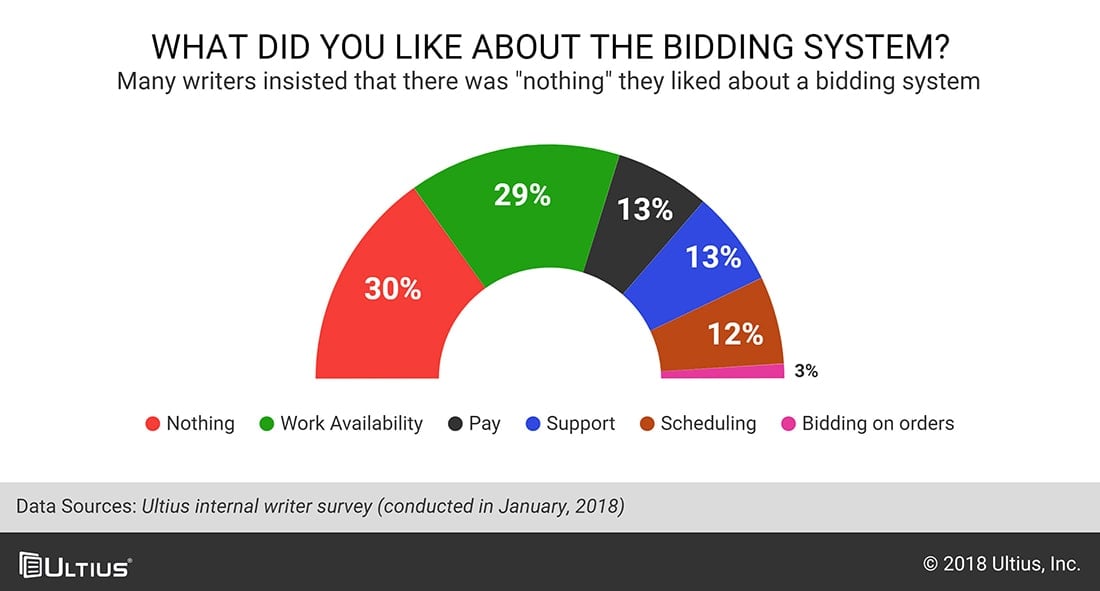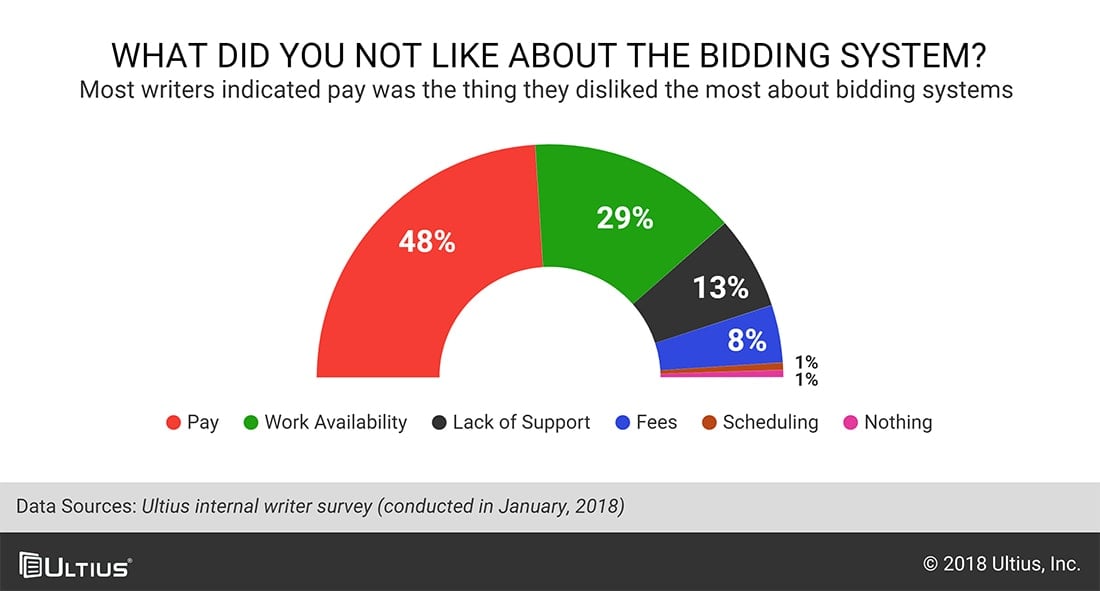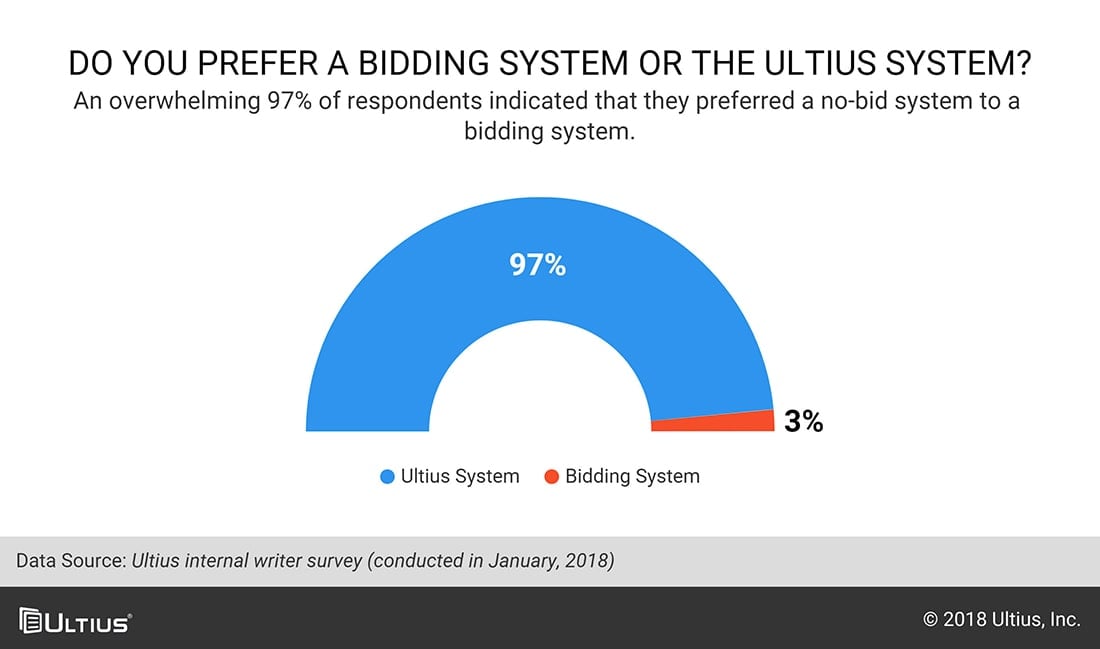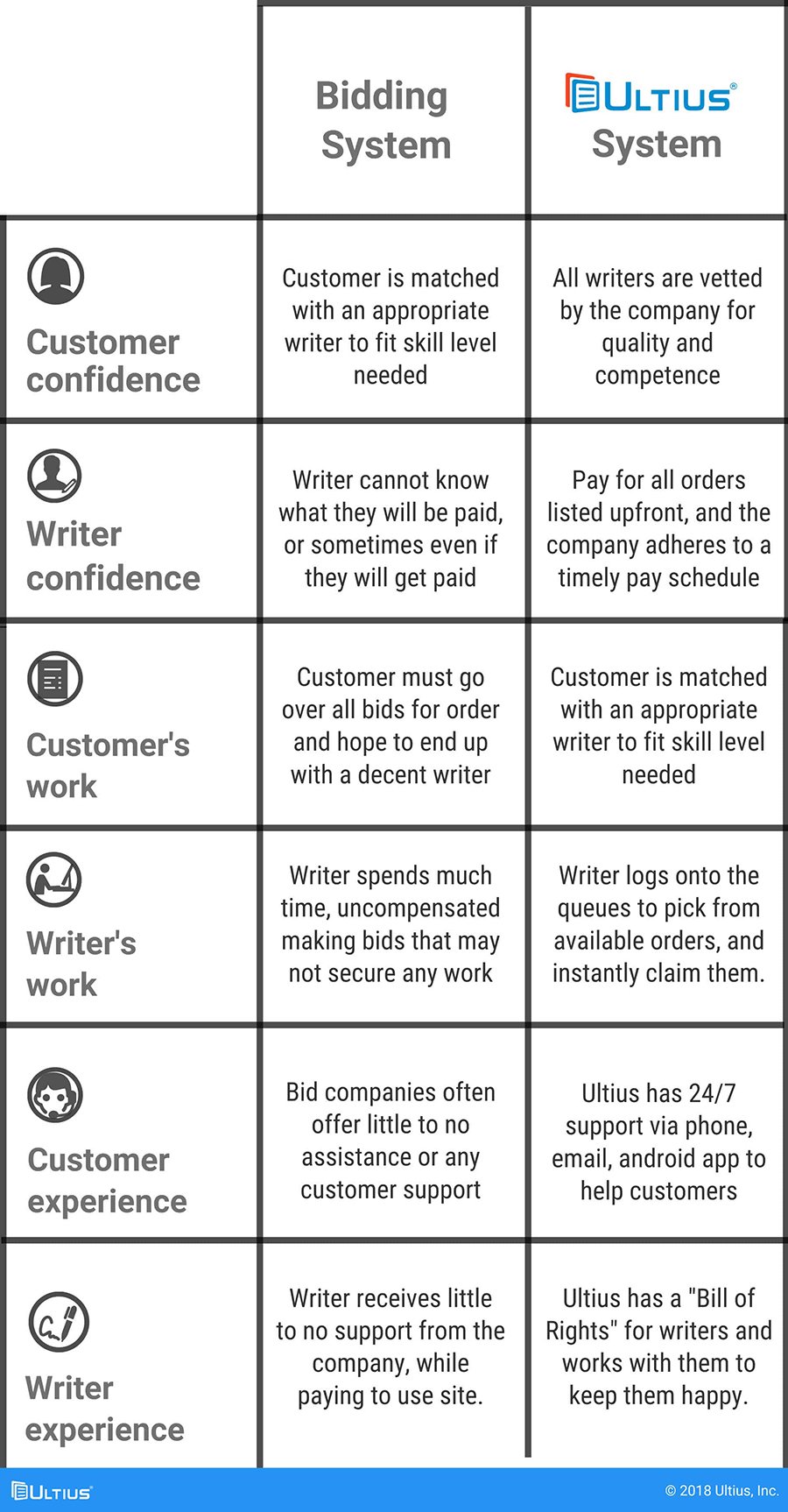Ultius Blog
The Bad Side of Bidding System Marketplaces For Writers
Many freelance writers have had experience with a bidding system. This is when a writer places bids on available orders through a platform, and then the potential customer chooses a writer to work on an order on the basis of the bids.
Some people believe that a bidding system is fair because it matches up with the laws of supply and demand.
According to Adam Hayes of Investopedia,
"The relationship between demand and supply underlie the forces behind the allocation of resources. In market economy theories, demand and supply theory will allocate resources in the most efficient way possible."
Bidding could be seen as a way to reach the fair market price for writing work. However, this is overly simplistic. It ignores the possibility of a race to the bottom. Lucia Pradella of Jacobin magazine has discussed how when there is total free competition without any regulation, quality itself can plummet.
The people who are willing to work for a pittance will undercut the higher-quality workers who need to charge more for their services. When it comes to writing, this means that a bad writer can afford to charge less for work than a good writer, for the simple reason that his writing will be bad and thus not require as much time, care, or attention to produce. The end result would be a situation where everybody loses.
This article presented by Ultius will make the strong argument that bidding systems for writing jobs are a terrible idea. They hurt both the writers and the customers. Ultius has conducted an internal study in order to compile data from our writers' perceptions of bidding systems.
The numbers included in this survey are based on the one-hundred-eighty-two answers we’ve received.
The results were overwhelmingly negative.
This article will draw on this dataset as well as other information on the subject in order to make its argument.
The article will have three main parts:
- Why bidding systems are bad for customers.
- Why bidding systems are bad for writers.
- An alternative model to the bidding system.
The main conclusion that will emerge is that the model used by Ultius is far superior to bidding systems, in terms of both writer and customer outcomes.
Writing marketplace bidding systems are bad for customers
One of the main reasons that bidding systems are bad for customers is the fact that such systems simply waste time. The customer must sift through a large number of bids, many of which may not even be legitimate. This is very time-consuming in order to find a writer who seems like they may be able to do a good job on the order.
For example, the platform WriterBay uses of a bidding system; and according to information provided on the website itself, less than 50 percent of its writers are actually from North America.
The company only provides a chart without specific numbers, but it looks like this:
A suspiciously low bid could indicate something is wrong to a customer.
- It could mean that the writer is lives in a developing nation, which is the only reason that he is able to bid so low.
- It could also mean that the writer is not proficient in English, and that the customer can expect to get what he pays for.
Or it could perhaps mean that the "free market" is working as it should, and the customer will just get a good deal on a good product. The key point here is that the potential customer just cannot know: the entire process turns into a crapshoot.
Recently, there has been an influx of writers from countries such as Kenya populating many freelance sites.
While many Kenyan writers are trying to make an honest living, there are just as many dishonestly claiming as many orders as possible.
This lets them simply churn out low quality work, with little repercussion.
The blog thescholarspost.com, had put it as such:
“These freelancers have no idea what it means to write a quality custom paper. They wear the Kenyan badge with pride, and I cannot fault them for that. I am one proud Kenyan. However, this group of greedy freelancers goes around parading their alleged “Kenyan-ness.” They lie to clients about how they can deliver quality work but end up doing a poor job. They also never say ‘no’ to any assignment, irrespective of their knowledge or skill on the field.“
This is troubling in a number of ways for customers
- Many of the companies that use bidding systems are based outside the United States.
- Many bidding-based companies employ just about anyone who simply makes an account as a writer.
- There is no quality control, no support, and no guarantee of quality work.
In a bidding system, not only would the customer have to sort through all the bids for an order before selecting a writer to work with, the customer simply has no way to determine whether he/she is making a smart selection. A customer has to make the decision if they even want their project available to bid, or if they just need something done at a set price. This may depend on the value the customer places on their project.
In principle, if you were using a bidding system, then you should ignore the lowest bids. This is because there is no way that a qualified and competent writer would agree to work for that sort of rate. It places a lower value on his/her higher quality work.
For example, imagine having a home built. You have budgeted $100K to build it.
- One contractor says they can build it for exactly $100K
- Another says they can do it for $80K
- One says they can do it for just $50K!
That sounds too good to be true — and it usually is.
What is the likelihood the lower bidders are using the same quality materials as the highest? You would assume the highest priced contractor would be using the best materials possible for the job, and still need to make a profit. In regards to writing, materials could be considered the skills the writer has, including their educational background, writing experience, and other factors. There is a reason they command a higher price.
Alas, this would go against the basic ethos of the bidding system itself.
Questions to consider before you bid
- Does a writer with a substantially lower bid have access to the same resources and materials as higher bidders?
- Does the writer understand the scope of the work, and all the technicalities involved with the project their bidding on?
- What qualifies the writer to work on your project?
- Will this likely require a change order, negating the initial bid anyway?
- What recourse do I have for substandard work?
Essentially, you’ll get what you pay for, and this applies to any industry, or craft that utilizes bidding, including writing.
The customer would have to take the time to independently make a series of complicated judgments, because the most bidding-system companies themselves do not provide the customer with any help or support whatsoever.
Why are American writers important?
A company such as WriterBay tries to sell the international backgrounds of its writers as an advantage in terms of "diversity." But, it's safe to say that when it comes to ordering an English-language document, that requires an intimate knowledge of American English, this is one kind of diversity that the customer does not want to see.
There is no guarantee that a writer based in South America, Africa, or Europe speaks English as a first language, or even that the writer even speaks English at all. The low prices on bidding systems that are open to international offers could thus be reflective of the fact that the writer is not good with English—which, would be a obstacle for this kind of work.
It’s also worth keeping in mind that even a native English speaker from outside the United States may use different phrasing, and even wording, compared to an English speaker from within the U.S. If the customer is looking for college-level academic sample work, then it is important to go with an American writer, and to ensure that the writer has college-level educational experience.
America has many of the best educational institutions in the world. So, to ensure the production of high-quality, English writing, customers would do well to work with an American company that is committed to working only with American writers with college degrees.
This is a commitment Ultius makes, and it's a commitment that no platform that uses a bidding system is able to extend to its customers.
Now hiring writers.
Work from home, great
side hustle.
Bidding systems foster low quality
The internal study conducted by Ultius produced findings that should make potential customers concerned about bidding systems. One of the writers who responded to our survey declared the following:
"Bidding systems foster lower quality writing and make it impossible for writers to earn what they deserve for their work."
A writer may bid low on an available order just because he needs the money, and a little money is better than no money. But this does not mean they will do the best job possible. Rather, they will likely rush and produce mediocre work that just barely meets passable standards. At the rate they are working for, it will not be possible for them to dedicate any further craft to the product.
This reality is reflected in the following statement by another of our respondents:
"Bidding systems drive down the price of any assignment at the expense of quality. I was constantly underbid by writers who would spit out meretricious garbage not worth the $4/page they were asking for."
The fact is that a legitimate, professional writer living in America cannot agree to work for the sort of rates offered by bidding systems and still deliver high-quality work. The average customer, may not be aware of this fact, and trust the bidding system.
He may assume that the lowest price available offers the best deal. But this is simply not how it works. The fact is, that the lowest price being offered is probably for poor writing; but better writers will still feel the need to compete against that price and thus sell their own services for less than what those services are worth.
This will likely result in the better writers themselves eventually producing mediocre to low-quality work. There is no motivation to create higher-quality work, because they will likely price themselves out of competition.
This is the race to the bottom, a vicious downward spiral. From this analysis, it should be clear that the entire structure of bidding systems diminish the quality of work that is produced, to the point that good writers will either downgrade their own work or just leave the system altogether.
This cannot possibly be good for the customer. The situation is such that the best writers may have left the system altogether, because they could not tolerate having to degrade their work and compete with poor writers. The customer would be left hiring writers from a self-selecting pool of mediocrity.
Your confidentiality means nothing in public auction-style bidding websites
Another problem with bidding systems, emerging from the problem of low quality that has already been discussed above, is that companies that use bidding systems often tend to be what could only be called “sleazy”. For example, since they have no inherent credibility based on producing consistent high-quality outcomes, they actually advertise the work they have produced in order to encourage bidding.
The platform EssayShark, which uses a bidding system, also uses customer order data in order to advertise the work that has recently been done by the company.
While no personally identifiable information is revealed here, this is still too close for comfort for most. It is difficult to feel confident that such a company would never go further, and actually share previous work for customers as a form of advertising. Of course, they need this sort of advertising exactly because the actual quality of work produced by bidding systems can vary greatly. Ultius has a quality control system that is guaranteed by the company itself, so the customer is never at risk of receiving an inferior product. Ultius is also keenly aware of how important the customer's confidentiality is.
No aspect of the customer's personal information or order information is ever made public, and the sample work available on the company's website has been specifically produced for sample purposes: it is not previous work produced for customers, and it will never be that.
Left to your own judgment
Another problem with bidding systems is that customers looking for writing services often are not aware of everything they want or need in their final product. The customer often needs to trust the writer and the company to live up to quality standards. The customer himself may not be able to tell the difference between a good product and a bad product, thus being why they looked for a writer in the first place.
This means that with a bidding system,
- the customer may opt for the lowest price
- receive unusable material in return
- then not know the piece was unusable until it is too late.
As one of the respondents to our survey said:
"Many customers . . . don't fully know what they want."
This becomes a serious problem with bidding systems, as another respondent has indicated:
"Bidding systems prevent high caliber writers from connecting with clients. . . . Bidding systems attract amateur writer(s) looking for supplemental income."
Not only are the writers working with bidding systems likely to be of lower caliber, the companies themselves do not even assign the writers to the customers' orders. This means that the customer has to sift through the mediocre pool (while not even knowing the pool is mediocre) and try to find the best deals, where the lowest bids will almost certainly be correlated with inferior quality work.
Even after the customer puts in all the time to pick a writer for the job, there would still be no guarantee that the customer will receive a good product in the end. In fact, for the low rates produced by bidding systems, no self-respecting writer would produce anything better than mediocre work in the first place.
Bidding systems are bad for writers (financially)
It is worth turning attention to why and how bidding systems are also terrible for writers. We at Ultius conducted a survey of our own writers, and received responses from 36 of them who had previous experience working with bidding systems (we do not use a bidding system).
The reasons why bidding systems are bad for writers mirror why they are bad for customers. For example, the race to the bottom comes up again. One of our respondents has indicated the following:
"The main problem with bidding is being underbid, in effect, devaluing my work for the sake of getting paid."
The problem is that the competition is not really fair, because the people who are bidding the lowest are likely lousy writers. However, the customer may not know that, and they may feel very tempted to just go with the lowest bid. The writer, knowing this is how the customer thinks, will feel pressure to bid lower—even though if he is any good, he will know that his work is worth more than that bid. This will lead to him lowering the quality of his own work. If the writer is, in fact, serious about his craft and his profession, then this kind of race to the bottom will inevitably leave him demoralized.
Several of our respondents indicated that if Ultius ever switched over to a bidding system (which we will not), they would actually want to quit. That's how strong the negative reaction to the very idea of a bidding system was.
For example, here is one comment from a respondent to our survey:
"If Ultius implements a bidding system, I doubt I will continue to work with the company in the future. I would be immensely sad to end our relationship in this way."
Again, Ultius is not implementing a bidding system. This comment is just meant to show how badly many of the best writers feel about such systems. Serious writers have the most to lose from a bidding system, because they will be forced to undervalue their work as they compete with mediocrity or even downright “garbage”.
The prisoner's dilemma when it comes to a bid-based system
In principle, if all writers on a bidding system platform agreed to not bid lower than a certain amount, then this would have the effect of driving all prices up, but this unlikely to ever happen. For one thing, the different writers making use of a bidding system are not able to contact each other, so they would have no way of developing this kind of conspiracy. Moreover, there is the prisoner's dilemma to consider.
The prisoner's dilemma is an important concept in game theory, and when applied to bidding for writing work, it would look like this:
- If writer A and writer B both do Action X (Underbid), then they will both lose.
- If neither one does Action X, then both of them will win.
- If only one of them does Action X, then the one who does it will win, and the one who doesn't will lose.
- Writer A and Writer B can't communicate (or don't trust each other), so neither knows what the other one is going to do.
- So, both writers will likely do Action X, and both lose.
The ideal outcome would be for all writers to agree to not underbid, so that they can all win—but of course, that is never going to happen. The whole structure of a bidding system is against that outcome. The system is set up so that the writers will undermine each other and be forced to settle for less pay than what their work is worth.
If this is not demoralizing, then it would be hard to say what is. This is why no self-respecting writer could really put up with a bidding system for very long. If a writer is working with such a system, then it is generally either because he is not serious about his craft, or because he is just desperate for the short-term money.
The problem of a global marketplace
Another problem with bidding systems for writers is that such systems are often open to a global marketplace. This can be great for the customer but pretty bad for talented writers living in America. For example, many people in a nation such as India are fluent in English; and given the low average costs of living in India (as well as the exchange rate between the American dollar and the Indian rupee), even a talented Indian writer would be able to work for much less than an equally talented American writer.
It is impossible for an American writer to compete within such a setting. Rather, such a writer would have to pursue customers who see inherent value in working with an American writer for reasons of professionalism and credibility.
This could be called fair economic competition.
As William Scheurman has indicated in an article on globalization for the Stanford Encyclopedia of Philosophy, outsourcing jobs to developing nations is a general feature of the modern globalized economy. However, this still raises important questions regarding quality and craft, especially when it comes to intellectual and high-skilled work such as producing English language documents.
An American writer who wants to hone their skills and produce high-quality work would do well to work with a platform such as Ultius that does not force them to compete with writers from the developing world, willing to work for a pittance.
Inconsistent and/or unreliable pay
For writers, another key problem with bidding systems is that they is never any guarantee that any individual writer will be able to pick up enough work to make a living. For one thing, the prisoner's dilemma described above is always driving prices down. This means that a writer can't actually know how much any available work will be worth on any given day, or how much competition is present at the moment. A bidding system therefore necessarily implies inconsistent pay.
Sometimes, even a good writer may not even be able to find enough work to make a decent living. This is why many writers who work with bidding systems tend to engage with many of them at the same time. This adds to both the stress and the demoralization felt by the writer. Writers don’t want to worry about having to sell themselves to the customers; what they really want to do is just get to work on writing.
Bidding systems force writers to engage in marketing for each and every order they take on, which can significantly add to the number of hours worked, and thus depress the pay even further. As one of our respondents has put the matter:
"I feel that bidding is very counter-effective. You spend so much time competing for other bids that you lose sight of the project."
This is because with a bidding system, every single order involves a rigorous process of competition. Not only can this be demanding on the writer's attention, the writer is not even guaranteed to get the order he was spent so much time pursuing.
An inevitable consequence of bidding systems is just a lot of wasted time and energy all around.
Bidding is an overall negative experience
The respondents to our internal Ultius survey overwhelmingly indicated that working with bidding systems is an overall unpleasant experience.
In addition to the factors that have been discussed above, there is also the fact that many writers feel that bidding systems force them to perform work for which they are not compensated. This of course includes the effort of bidding for new orders, which is never compensated.
There is also the problem of writers often being required to provide sample work for free:
"Bidding systems require a significant amount of work from the writer that is often underpaid or alternatively, produced without guarantee of pay at all."
Moreover, there is often limited support from the companies that run the bidding platforms, even as the writer is forced to pay such platforms a substantial cut simply for the privilege of using the platform. The writer is left to his own resources and has to act as his own private company, even as the platforms themselves are taking a lot of money and pretending to work in cooperation with the writer.
It is fairly clear that this is an all-around negative experience, and that serious writers should avoid bidding systems whenever possible. Many writers work with bidding systems simply because they perceive that there is no real alternative when it comes to making a living as a freelance writer.
They would be wrong about that. There is in fact an alternative — the Ultius alternative.
The Ultius alternative
Ultius does not use a bidding system, and the company is committed to never using one. Rather, Ultius offers work to its writers on a first-come, first-served basis (read how it works).
Ultius has three main queues through which writers can pick up orders:
- Freelance queue
- Urgent queue
- Graduate queue
The first queue is open to all Ultius writers, whereas the other two are restricted and require writers to prove their talent and competence in order to gain access.
Once access is granted, those queues also operate on a first-come, first-served basis.
Good for customers
The Ultius system works very well for customers, because the customer does not have to waste time with sifting through all the bids and picking a writer on his own. Rather, the customer can be rest assured that all writers who work with Ultius have a high level of competence.
Ultius has a rigorous screening and vetting process that ensures that only qualified, American writers with college graduates have access to the Ultius system in the first place. Moreover, Ultius matches the customer with the writer through the use of algorithms.
Ultius allows the customer to choose specifications when placing an order.
Ultius customers can indicate the exact type and level of writer needed (as shown in this page), and also...
- Ask for the best available writer
- Specify that he wants a graduate writer
- Choose to request a writer with whom they have worked successfully in the past.
Our software performs the heavy lifting, and there is no need for the customer himself to worry about whether he will be getting a writer that is up to the task of completing the order at hand.
With Ultius, then, the customer is not just left to his own judgment and in the hands of luck. We understand that the customer often may not be sure of exactly what he wants, and we thus make it our job to ensure that the customer will be matched with a writer who is competent and qualified to take care of the order.
All Ultius writers:
- Are American and speak English as a first language
- Have a college degree from an American institution
- Have passed our internal vetting for quality
- Have a proven track record of delivering prompt and high-quality work to customers
These are guarantees that are not in place with bidding platforms because in order for bidding systems to even function, it is necessary for the writer pool to have a wide selection of talent, credentialing, and seriousness. Otherwise there would be no need for a bidding system at all, since writers who are all highly qualified would all insist on a very similar pay grade for the work that they do.
Customer facts about Ultius.
- Ultius is located in the United States.
- Uses an extensive screening process, including requiring a sample, and an interview before you may be invited to write for us.
- Ultius has 24/7 customer support available for all customers.
- Ultius works with editors as well. These editors review each order for quality control before they are sent out.
- Ultius has a satisfaction guarantee, something no bidding-based company is willing to offer.
- Offers a free app for Android for your convenience.
Ultius delivers consistent pricing to customers that are reflective of this basic pay grade for writers. The benefit for the customer is knowing that their work will be done by a committed professional and not just by some random amateur.
Good for writers
As has been indicated above, the respondents to our survey indicated almost unanimously that they prefer the Ultius system to bidding systems. One respondent said the following:
"The one thing I love about Ultius is that I know what I will be paid and we are all on a level playing ground."
In part, this is a reference to the fact that Ultius eliminates the race to the bottom.
Ultius itself fixes the prices on the orders, based on three objective criteria:
- Deadline
- Writer level
- Page count
There is a sliding scale for pay per order on the basis of these three factors, but the system itself is objective.
A writer can choose to accept an order for the listed pay or not accept it, but there is absolutely no bidding involved: the pay for the order does not change depending on what other writers say about it. Moreover, Ultius is committed to cultivating and sustaining a positive work environment for our writers. Toward this end, the company has developed a bill of rights for contractors, which includes the following elements:
- Self-determination
- Protection of privacy
- Respectful engagement
- Fair pay for fair work
- Timely payment schedule
- Fair hearing and objective assessment
On a day-to-day basis, the most important element of this list is perhaps fair pay for fair work. Ultius is committed to ensuring that writers do not have to undersell themselves, and that they will be compensated appropriate for their hard, high-quality work. The very nature of a bidding system is such that it must violate this basic principle. Its entire business model is premised on such violation.
Symmetrical advantages
It is worth emphasizing here that the Ultius system provides advantages for both customers and writers, just as bidding systems produce drawbacks for both customers and writers.
Conclusion
In summary, this article has shown why bidding systems are bad for both customers and writers. The discussion has made it clear that bidding systems provide little consistency for customers, with the lowest bids often being correlated with low-quality work. The customer ends up paying for a useless product, perhaps without even knowing it — this is called a scam. Bidding systems are also bad for writers because they catalyze a race to the bottom, where good writers are forced to devalue their own work in order to compete against worse writers who are underbidding on purpose, only to then churn out mediocre to poorly-written work.
The Ultius system involves consistent vetting to ensure that all writers are highly qualified. This makes work available to writers on a first-come, first-served basis, avoids the pitfalls of bidding systems and generates many benefits for both customers and writers. The customer can rest assured that his order will be matched with a competent American writer with a college degree; and the writer can rest assured that he will be fairly compensated for his work and that he will never be forced to devalue his work.
The Ultius system is in fact unusual for the freelance writing business, and almost all of the writers we surveyed indicated that they vastly preferred our system to bidding systems. As this discussion has shown, customers should also be just as happy when they work with Ultius, because the benefits our system produces for writers are mirrored by the benefits it produces for customers as well. The Ultius system is in fact unusual for the freelance writing business, and almost all of the writers we surveyed indicated that they vastly preferred our system to bidding systems.
As this discussion has shown, customers should also be just as happy when they work with Ultius, because the benefits our system produces for writers are mirrored by the benefits it produces for customers as well.
Afraid you’re being scammed? Avoid online writing scams with help from our how-to guide!
More comments from Ultius writers taken from the internal survey.
“A large part of the issue is that the bidding systems I have worked with include non-American writers who repeatedly underbid American writers.”
—
"Bidding led to less pay and more competition for writers. Increased stress unilaterally. Quite frankly, it made writing miserable. Finding a non-bidding website was like finding a needle in a haystack, and I'm very glad I did."
—
“Bidding systems are great for extra cash but not reliable. I write for Ultius as primarily my full time income and it provides more needed, consistent, steady and reliable work than a bidding system like Upwork”
—
“I feel as though the quality of my work counts for much less when I have to underbid just to get work at all.”
—
“One of the things I enjoy most about Ultius is the straightforward transaction of knowing how much work I will need to do and how much compensation I will get. I intentionally stray away from orders where the time vs. money calculation is not as clear. Bidding essentially turns all orders into a hazier scenario where it is unclear whether the time spent will be worth the money earned.”
—
“In my experience with sites like Freelancer.com, bidding typically results in writers earning less than their time is worth. Moreover, inexperienced writers can often underbid veteran writers, thus increasing the ratio of work that goes to writers of a lower quality. Eventually, excellent writers leave the system, and only mediocre or lackluster ones remain. I will not work for a bidding site again.”
—
“In many bidding systems, one had to do all of the work of "selling" one's services to the customer, with little to no assistance from the company. It is as though one is working for one's self, but having to pay hefty fees to the company simply for the privilege of using the platform.”
Now hiring writers.
Work from home, great
side hustle.
Works Cited
Hayes, Adam. "Economic Basics: Supply and Demand." Investopedia. n.d. Web. 15 Jan. 2018. <https://www.investopedia.com/university/economics/economics3.asp>.
Pradella, Lucia. "The Global Race to the Bottom." Jacobin. 1 Sep. 2015. Web. 15 Jan. 2017. <https://www.jacobinmag.com/2015/09/merkel-austerity-globalization-eu-poverty/>.
Scheurman, William. "Globalization." Stanford Encyclopedia of Philosophy. 2014. Web. 17 Jan. 2018. < http://plato.stanford.edu/entries/globalization/>.
The Scholars Post. “Are Kenyan Freelancers Honest or Scammers?”. 7 Oct. 2017 <http://www.thescholarspost.com/are-kenyan-freelancers-honest-or-scammers/>
Ultius. “Internal Writer Survey.” Ultius Inc. 20 Jan. 2018.
U.S. News & World Report. "Best Global University Rankings." Education. n.d. 17 Jan. 2018. <https://www.usnews.com/education/best-global-universities/rankings?page=6>.
- MLA Style
- APA Style
- Chicago Style
- Turabian
Ultius, Inc. "The Bad Side of Bidding System Marketplaces For Writers." Ultius | Custom Writing and Editing Services. Ultius Blog, 27 Feb. 2018. https://www.ultius.com/ultius-blog/entry/the-bad-side-of-bidding-system-marketplaces-for-writers.html
Copied to clipboard
Click here for more help with MLA citations.
Ultius, Inc. (2018, February 27). The Bad Side of Bidding System Marketplaces For Writers. Retrieved from Ultius | Custom Writing and Editing Services, https://www.ultius.com/ultius-blog/entry/the-bad-side-of-bidding-system-marketplaces-for-writers.html
Copied to clipboard
Click here for more help with APA citations.
Ultius, Inc. "The Bad Side of Bidding System Marketplaces For Writers." Ultius | Custom Writing and Editing Services. February 27, 2018 https://www.ultius.com/ultius-blog/entry/the-bad-side-of-bidding-system-marketplaces-for-writers.html.
Copied to clipboard
Click here for more help with CMS citations.
Ultius, Inc. "The Bad Side of Bidding System Marketplaces For Writers." Ultius | Custom Writing and Editing Services. February 27, 2018 https://www.ultius.com/ultius-blog/entry/the-bad-side-of-bidding-system-marketplaces-for-writers.html.
Copied to clipboard
Click here for more help with Turabian citations.

